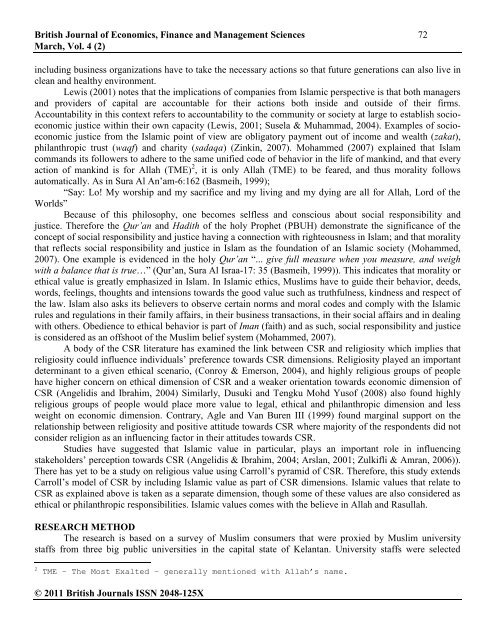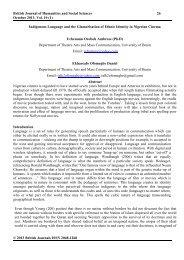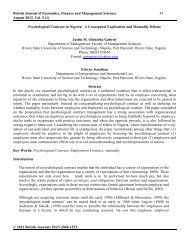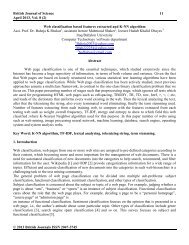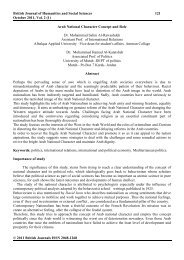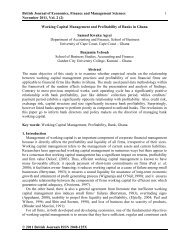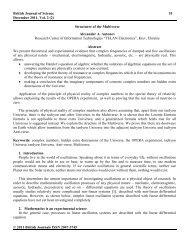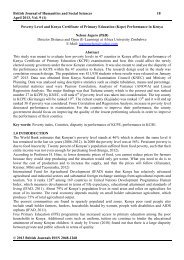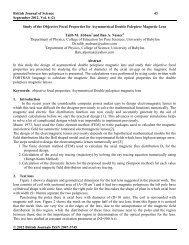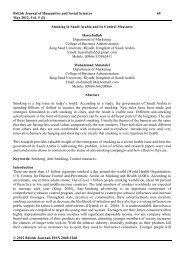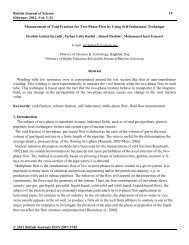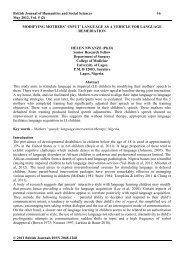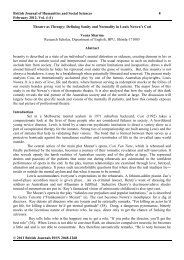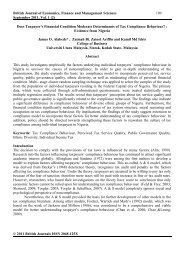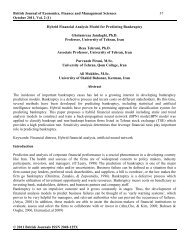the perception of muslim consumers towards corporate social ...
the perception of muslim consumers towards corporate social ...
the perception of muslim consumers towards corporate social ...
You also want an ePaper? Increase the reach of your titles
YUMPU automatically turns print PDFs into web optimized ePapers that Google loves.
British Journal <strong>of</strong> Economics, Finance and Management Sciences 72March, Vol. 4 (2)including business organizations have to take <strong>the</strong> necessary actions so that future generations can also live inclean and healthy environment.Lewis (2001) notes that <strong>the</strong> implications <strong>of</strong> companies from Islamic perspective is that both managersand providers <strong>of</strong> capital are accountable for <strong>the</strong>ir actions both inside and outside <strong>of</strong> <strong>the</strong>ir firms.Accountability in this context refers to accountability to <strong>the</strong> community or society at large to establish socioeconomicjustice within <strong>the</strong>ir own capacity (Lewis, 2001; Susela & Muhammad, 2004). Examples <strong>of</strong> socioeconomicjustice from <strong>the</strong> Islamic point <strong>of</strong> view are obligatory payment out <strong>of</strong> income and wealth (zakat),philanthropic trust (waqf) and charity (sadaqa) (Zinkin, 2007). Mohammed (2007) explained that Islamcommands its followers to adhere to <strong>the</strong> same unified code <strong>of</strong> behavior in <strong>the</strong> life <strong>of</strong> mankind, and that everyaction <strong>of</strong> mankind is for Allah (TME) 2 , it is only Allah (TME) to be feared, and thus morality followsautomatically. As in Sura Al An‟am-6:162 (Basmeih, 1999);“Say: Lo! My worship and my sacrifice and my living and my dying are all for Allah, Lord <strong>of</strong> <strong>the</strong>Worlds”Because <strong>of</strong> this philosophy, one becomes selfless and conscious about <strong>social</strong> responsibility andjustice. Therefore <strong>the</strong> Qur’an and Hadith <strong>of</strong> <strong>the</strong> holy Prophet (PBUH) demonstrate <strong>the</strong> significance <strong>of</strong> <strong>the</strong>concept <strong>of</strong> <strong>social</strong> responsibility and justice having a connection with righteousness in Islam; and that moralitythat reflects <strong>social</strong> responsibility and justice in Islam as <strong>the</strong> foundation <strong>of</strong> an Islamic society (Mohammed,2007). One example is evidenced in <strong>the</strong> holy Qur’an “... give full measure when you measure, and weighwith a balance that is true…” (Qur‟an, Sura Al Israa-17: 35 (Basmeih, 1999)). This indicates that morality orethical value is greatly emphasized in Islam. In Islamic ethics, Muslims have to guide <strong>the</strong>ir behavior, deeds,words, feelings, thoughts and intensions <strong>towards</strong> <strong>the</strong> good value such as truthfulness, kindness and respect <strong>of</strong><strong>the</strong> law. Islam also asks its believers to observe certain norms and moral codes and comply with <strong>the</strong> Islamicrules and regulations in <strong>the</strong>ir family affairs, in <strong>the</strong>ir business transactions, in <strong>the</strong>ir <strong>social</strong> affairs and in dealingwith o<strong>the</strong>rs. Obedience to ethical behavior is part <strong>of</strong> Iman (faith) and as such, <strong>social</strong> responsibility and justiceis considered as an <strong>of</strong>fshoot <strong>of</strong> <strong>the</strong> Muslim belief system (Mohammed, 2007).A body <strong>of</strong> <strong>the</strong> CSR literature has examined <strong>the</strong> link between CSR and religiosity which implies thatreligiosity could influence individuals‟ preference <strong>towards</strong> CSR dimensions. Religiosity played an importantdeterminant to a given ethical scenario, (Conroy & Emerson, 2004), and highly religious groups <strong>of</strong> peoplehave higher concern on ethical dimension <strong>of</strong> CSR and a weaker orientation <strong>towards</strong> economic dimension <strong>of</strong>CSR (Angelidis and Ibrahim, 2004) Similarly, Dusuki and Tengku Mohd Yus<strong>of</strong> (2008) also found highlyreligious groups <strong>of</strong> people would place more value to legal, ethical and philanthropic dimension and lessweight on economic dimension. Contrary, Agle and Van Buren III (1999) found marginal support on <strong>the</strong>relationship between religiosity and positive attitude <strong>towards</strong> CSR where majority <strong>of</strong> <strong>the</strong> respondents did notconsider religion as an influencing factor in <strong>the</strong>ir attitudes <strong>towards</strong> CSR.Studies have suggested that Islamic value in particular, plays an important role in influencingstakeholders‟ <strong>perception</strong> <strong>towards</strong> CSR (Angelidis & Ibrahim, 2004; Arslan, 2001; Zulkifli & Amran, 2006)).There has yet to be a study on religious value using Carroll‟s pyramid <strong>of</strong> CSR. Therefore, this study extendsCarroll‟s model <strong>of</strong> CSR by including Islamic value as part <strong>of</strong> CSR dimensions. Islamic values that relate toCSR as explained above is taken as a separate dimension, though some <strong>of</strong> <strong>the</strong>se values are also considered asethical or philanthropic responsibilities. Islamic values comes with <strong>the</strong> believe in Allah and Rasullah.RESEARCH METHODThe research is based on a survey <strong>of</strong> Muslim <strong>consumers</strong> that were proxied by Muslim universitystaffs from three big public universities in <strong>the</strong> capital state <strong>of</strong> Kelantan. University staffs were selected2TME – The Most Exalted – generally mentioned with Allah’s name.© 2011 British Journals ISSN 2048-125X


